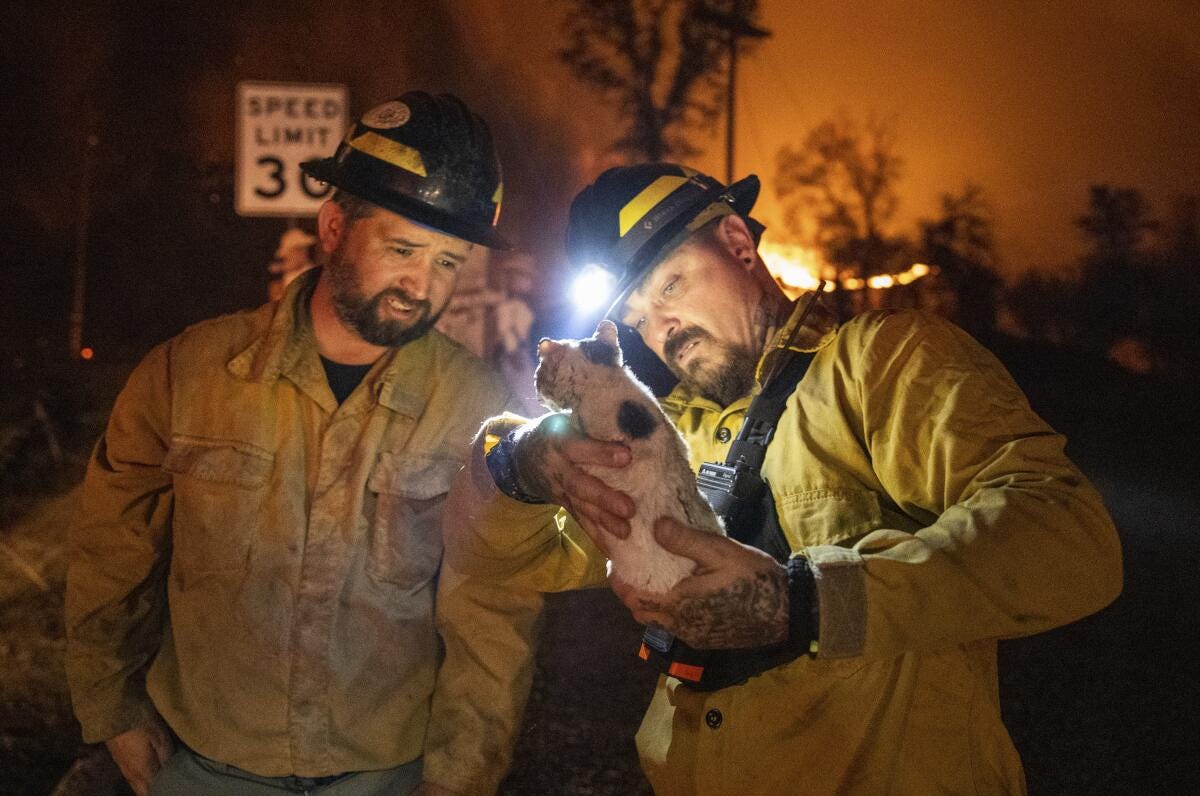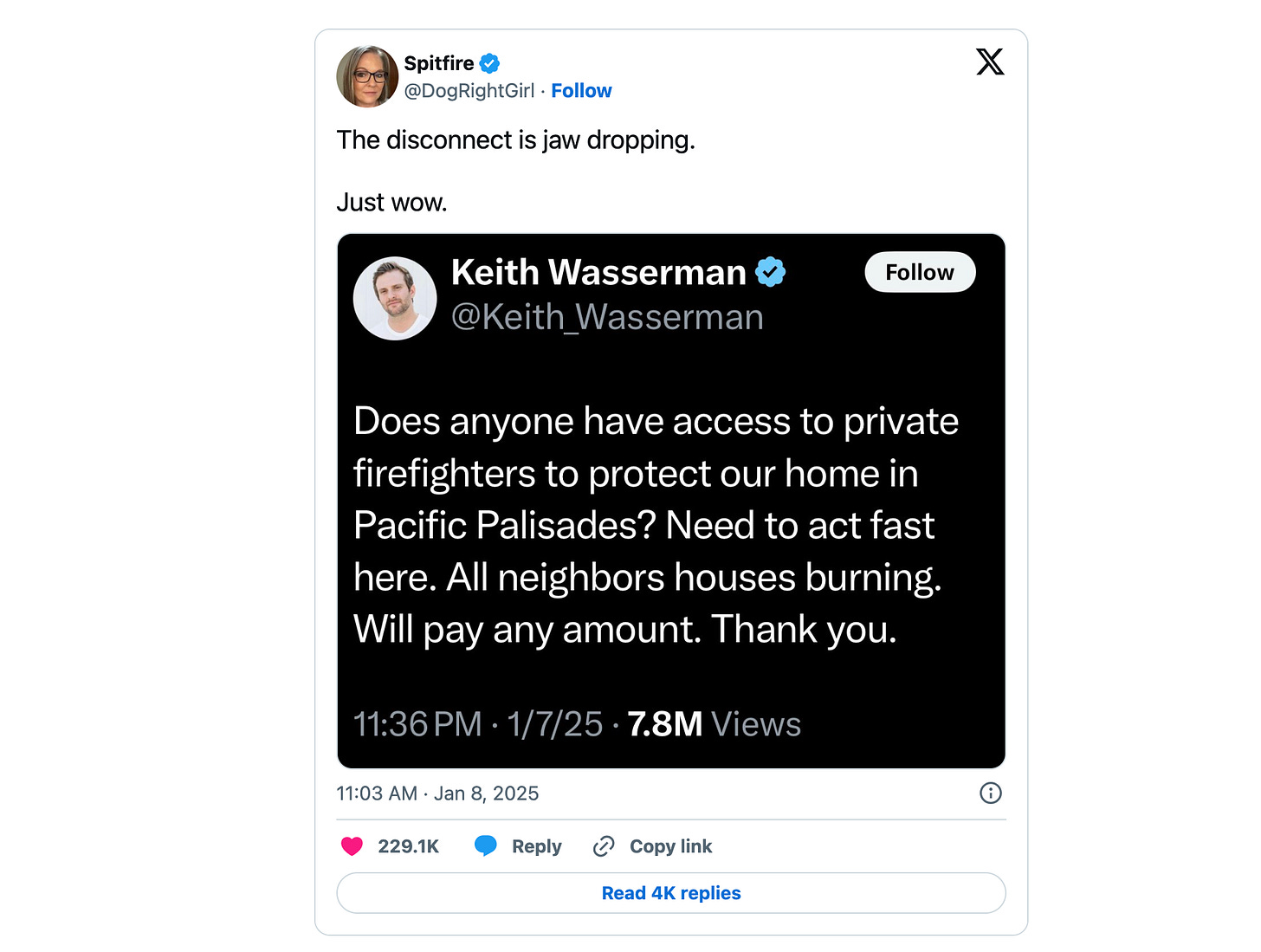The case for private firefighters in times of crisis
The backlash against private firefighting highlights discomfort with economic disparities, but it also raises critical questions about freedom and innovation.

As wildfires swept through Los Angeles last week, real estate executive Keith Wasserman made a desperate plea on social media: “Does anyone have access to private firefighters to protect our home in Pacific Palisades? Need to act fast here. All neighbors’ houses burning. Will pay any amount. Thank you.”
His post quickly went viral, igniting a mix of sympathy and outrage. Critics accused Wasserman of leveraging his wealth to buy safety, with one commenter calling the plea “incredibly tone-deaf.” The backlash prompted Wasserman to delete his account, but not before cheekily declaring, “Mama, I’m going viral!”
This situation raises a critical question: when public systems fail, is it wrong to seek private alternatives?
The harsh reality is that public services, including firefighting, healthcare, and law enforcement, are often constrained by limited budgets and resources. Or, in some cases, these services are actively undermined by the call to ‘defund’ them. Thus, in times of crisis, poor policies and myopic thinking become a showcase of defective thinking.
To wit: Private firefighters don’t inherently detract from public resources. In fact, they can alleviate pressure on municipal crews, allowing them to focus on life-saving priorities. Criticizing those who turn to private solutions is kneejerk; it does little to address the systemic issues of underfunded and overburdened public systems.
The rise of private firefighting mirrors a larger trend toward privatization of essential services. From ambulances to concierge healthcare, Americans increasingly rely on pay-as-you-go solutions for needs that once were met by public systems. This shift reflects declining public trust and chronic underfunding, not any specific effort to sabotage publicly-available services. Private solutions empower individuals and entrepreneurs to fill gaps left by public systems, particularly in emergencies.
Is it wrong for someone to use their resources to protect their property? If society accepts private jets, luxury cars, and first-class airplane tickets, why would hiring private firefighters cross the line? Critics argue this creates inequality, but freedom inherently includes the ability to use resources as one sees fit. Just as families invest in private schools or health insurance, hiring private firefighters is an exercise of personal choice.
Put another way, in a free society access to additional services beyond public provisions is a hallmark of individual liberty and innovation. What will soon be laid bare for all to see, given the scale of the Los Angeles disaster, is that relying on insurance companies to underwrite personal property is a fool’s errand. Wasserman’s call for private firefighters was very likely in recognition of his impossible situation; he may very well have known — if Hurricane Helene was any indication — that insurance companies look out for themselves first. So rather than fight the insurance company to cough up after his home was destroyed, it would be far more cost-effective to hire private firefighters to protect his residence up front. The alternative would be rebuild from the ground up on the assumption that funds (and frankly supply chains) would be available after the fact.
What Wasserman just showcased is the precursor of a new system of self-insurance. And, we should be applauding him, not vilifying him.
The backlash against private firefighting reflects discomfort with economic disparities rather than an inherent flaw in the service itself. Yet, free markets thrive on innovation and options — even if not everyone can afford them. Instead of criticizing private solutions, the conversation should center on strengthening public systems to ensure a baseline of protection for all. But that’s likely a pipe dream. If relying on bureaucracies for efficient resource allocation was the norm, the Musk/Ramaswamy ‘DOGE’ team would be moot.
Conventional insurance versus self-insurance is lining up to be an epic fight. To say nothing of the massive systemic pressures about to be unleashed when the last ember is snuffed out in California.
If the government makes everyone whole on this disaster, and potentially retroactively in Appalachia, the amount of printed fiat will be beyond comprehension. Such implications will make the bellyaching around hiring a private firefighting brigade seem like child’s play. Expect this disaster to unleash forces from which America, let alone California, may not ever bounce back.




I agree. If God has given you the ability and resources to protect yourself and your family from disaster then you are actually obligated to do so and to be grateful for those resources. But, because you are so blessed you are also obligated to use your fortune to help others less fortunate. After loving God and giving thanks to Him, love your neighbor as yourself.
Being suspicious, I wonder why the fire was so devastating and how it could have been handled better. Why was there no water in the reservoir and hydrants for instance? A lot of money was paid for a useless system. I wonder if geoengineering was involved, to set it up in the windy season. A lot of things don't add up in this epic tragedy so I think there's more to this story than meets the eye.